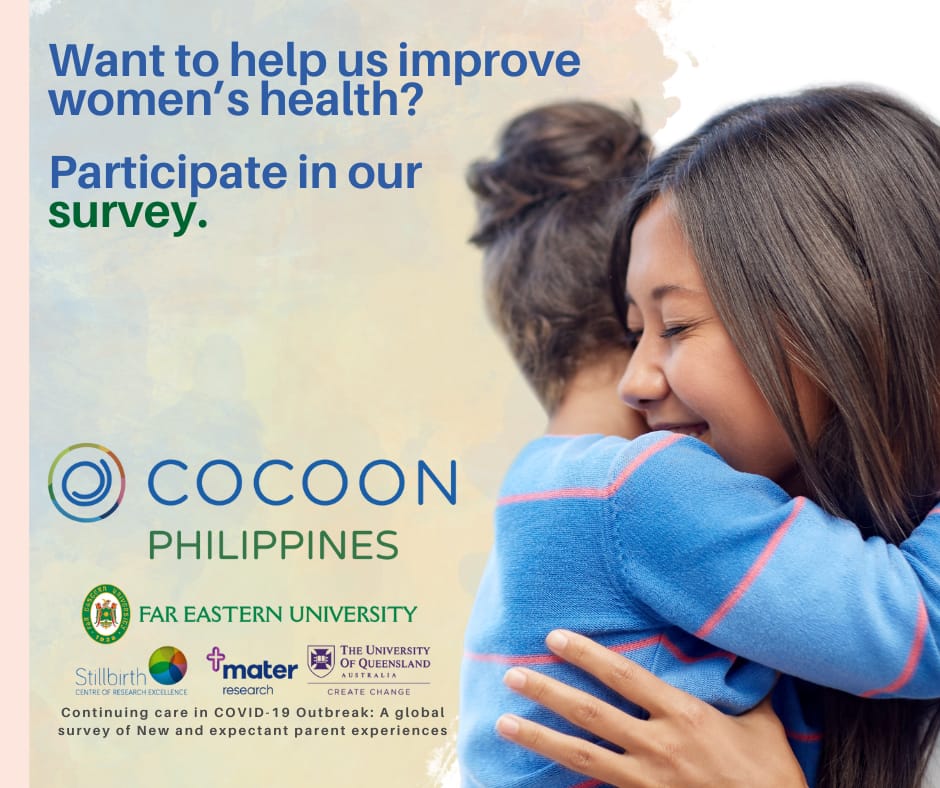The research initiative “COntinuing care in COVID-19 Outbreak: A global survey of New expectant and bereaved parent experiences (COCOON)” is led by Far Eastern University (FEU), as the Philippines is one of its contributing countries.

“COCOON Philippines is a collaborative project between FEU and the University of Queensland. It is a global project conducted in different countries. We are also collaborating with Mater Research Institute, King’s College London, and International Stillbirth Alliance.,” said Dr. Joemer Maravilla, supervising coordinator of COCOON and adjunct faculty of the FEU Nursing Department.
FEU is primarily funding COCOON Philippines through its University Research Assistance Grant (URAG), a university-wide research time and financial assistance to FEU academic researchers. The project is currently funded until 2026 and is headed by the principal investigator Asst. Prof. Joycelyn Abiog Filoteo of the Nursing Department, with Dr. Ana Nelia Lopez Jumamil of the Psychology Department as co-leads.
The project is one of the first projects in the university wherein two disciplines collaborate: nursing and psychology. It is also the first study in the Philippines that aims to look at the social determinants of stillbirth and neonatal deaths to parents.
Maravilla explained that according to the Department of Health, the Philippine government has no specific projects on bereavement care for mothers who had experienced stillbirth and neonatal death thus, positioning COCOON Philippines in the forefront in accessing and understanding the experiences and concerns of bereaved parents and developing support services appropriate for them.
Meanwhile, according to the 2021 World Health Organization country key indicators, the Philippines has a stillbirth rate of 10.17 per 1000 births, and a neonatal mortality rate of 12.28 (0-27 completed days of life) per 1000 births. Moreover, the United Nations International Children’s Emergency Fund released an article last January 2023 mentioning that the Philippines has an annual record of more than 25,000 stillborn babies.
“The focus of the country, at the moment, is to help mothers with safe deliveries but in cases of loss, we have no guidelines or in-depth data on it in the Philippines. We know there are cases of stillbirth and neonatal losses, but we do not know the solutions, the coping strategies we can introduce to help the grieving parents. And that is one of the expected outcomes of our study,” said Maravilla.
COCOON Philippines aims to include 1,100 participants, composed of pregnant women, women who experienced stillbirth and neonatal death, and their partners. The data collection involves a mixed self-administered online survey and face-to-face survey in Metro Manila and Region IV-A (CALABARZON). Research participants will receive P250 as compensation for their time taking the survey.
As of this moment, COCOON Philippines already launched its official Facebook page and will serve as the research’s avenue in looking for additional participants. If people want to join this global initiative to improve women’s health and bereavement services, or if they know of others who are willing to participate, they can visit and message https://www.facebook.com/cocoon.
pinas.
Due to the sensitive nature of the study, links to online surveys will not be released publicly and will only be given to the successfully screened participants.